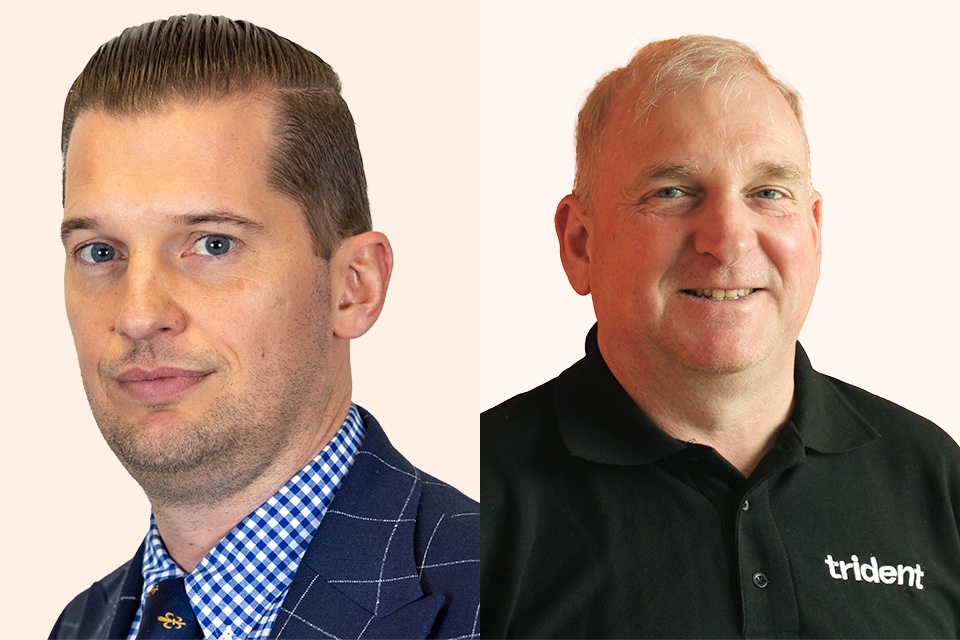In the latest instalment of our energy management industry executive interview series we spoke to Noah Nelson (pictured, left), Account Director and Steve Sorah (pictured, right), Sales & Marketing Director at Trident, about the challenges faced by the sector, how sustainability is becoming a strategic priority for many organisations, the value of joined-up procurement processes as we seek to decarbonise and the rewards that come from helping clients to make a real-world impact…
Tell us about your company, products and services.
Steve: We’re Trident, an independent, planet-first energy consultancy. We help businesses across the UK take practical, confident steps towards a carbon net zero future, while making sure they see real value along the way.
We work with a wide range of organisations, from large manufacturing industrials to multi-site retailers, supporting everything from energy procurement and invoice validation to net zero strategy, compliance reporting, and revenue recovery.
At the heart of what we do is our award-winning customer service backed by Pulse, our innovative software platform. Pulse gives our clients a real-time view of their energy use, emissions and cost-saving opportunities, along with expert, tailored support wherever they are on their journey. It’s all about making things clearer, so decisions can be made faster and with confidence.
Ultimately, we’re here to make energy and carbon management easier to handle, whether that’s helping someone just starting out on their sustainability journey or supporting a business that’s ready to take the next step.
What have been the biggest challenges the Energy Management industry has faced over the past 12 months?
Noah: Market volatility has been a major challenge. With fluctuating prices, shifting policy and uncertainty around carbon legislation, many businesses have been under constant pressure to adapt quickly.
Steve: Uncertainty around carbon legislation has not helped. Delays, changing guidance and political noise have created scepticism among some decision makers, making it harder for businesses to progress with their net zero plans. Add in the pressure to deliver against environmental targets without clear frameworks, the right data or the internal resource and it’s no surprise that progress has stalled for some.
And what have been the biggest opportunities?
Steve: There has been a real shift in mindset. More businesses are now viewing sustainability as a strategic priority rather than just a compliance issue. The commercial benefit stands on its own two feet and research shows that for every £1 invested in sustainable technology and measures, businesses receive £4 of benefit.
Noah: We’ve been banging the drum on this for years, and we’re now starting to see that message land. That has opened the door to more ambitious conversations, longer-term planning and a better understanding of how energy and carbon impact wider business performance.
What is the biggest priority for the Energy Management industry in 2025/2026?
Noah: Getting on with it. Many companies have made some sort of sustainability commitment, however, there’s still a level of good intent over tangible outcomes. The focus now has to be on delivery and turning that intent into action. That means putting credible net zero strategies into action, setting realistic goals, and tracking progress properly. It also requires proper investment, robust reporting and the right people and partners around the table.
What are the main trends you are expecting to see in the market in 2025/2026?
Steve: We expect to see a stronger push for joined-up thinking. In many companies, energy, carbon, procurement and compliance are still too often managed in isolation, but businesses are starting to recognise the value of a more integrated approach to energy and decarbonisation. Net Zero action drives energy efficiency, removing waste energy and carbon emissions, which will provide cost savings to business.
Noah: There will also be increasing demand for clearer, more detailed data, as businesses face rising pressure to report accurately and act with confidence. Scope 3 emissions will remain a priority, particularly around supply chain engagement and understanding the full carbon impact of operations.
What technology is going to have the biggest impact on the market this year?
Steve: We’re backing technology that simplifies the complex. Businesses need tools that help them make faster, more informed decisions based on reliable data. That includes energy management platforms, smarter reporting tools, and systems that can bring together energy and emissions data from across multiple sites or suppliers. Our own Pulse software is designed to do just that, helping clients turn insight into action and move forward with confidence.
In 2026 we’ll all be talking about…?
Noah: AI. Not just as the latest buzzword, but as a tool that is starting to show real use in energy and sustainability. From forecasting to optimisation, it certainly has the potential to support better decision-making. At the same time, concerns are growing about how energy-intensive AI can be. The environmental cost of training and running large models needs to be part of the conversation if we are serious about sustainability.
Steve: We will also be talking more about skills. As experienced people retire and demand for sustainability expertise rises, the sector needs to bring in new talent and invest in proper training. Without that, we’ll struggle to meet future targets.
Noah: Data quality will also continue to be part of the conversation. It’s not the most exciting topic, but it’s essential if we want to make credible progress. AI is only as useful as the data it relies on. Without good quality data, we’re just guessing.
What’s the most surprising thing you’ve learnt about the Energy Management sector?
Noah: How much hidden value there still is. Whether it is missed savings, unmanaged emissions or underused data, there is often far more opportunity than businesses realise. Once you start digging into the detail, the potential for improvement becomes clear.
Steve: You can have the best systems, data and strategy in place, but without the right people driving it forward, progress stalls. Relationships, collaboration and internal buy-in often make the biggest difference to whether something actually happens.
What’s the most exciting thing about your job?
Noah: Seeing the impact. Whether it is helping a client cut emissions, uncover hidden savings or take a real step towards net zero, seeing that work come to life is what it’s all about.
Steve: It’s also exciting to support the next generation. For years, the team at Trident has encouraged apprentices and graduates to join the business, and some of them have now been with us for over a decade. All they have known is energy, which is really encouraging for the future of the industry. We have also started conversations with local colleges about how we can engage the wider community on carbon and sustainability. Building awareness and sharing knowledge beyond our own business is something I really care about.
And what’s the most challenging?
Noah: Cutting through complexity. There is a lot of noise in this space, and helping clients focus on what really matters takes both clarity and trust. There is also a common misconception that net zero is only relevant for large or global companies. In reality, every organisation has a role to play, from sole traders and SMEs to multinational businesses. Our role is to help them find a path forward that is both practical and effective.
What’s the best piece of advice you’ve ever been given?
Noah: Don’t just aim to be right – aim to be useful. It’s not about showing how much you know, it’s about making a difference.
Steve: Keep things simple. If you can’t explain it clearly, it probably needs more thought.




